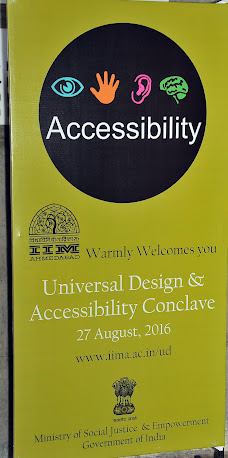 |
| Conclave Welcome Banner |
Dear Colleagues,
The Indian Institute of Management-Ahmedabad (IIMA) organized a Conclave titled "National Conclave on Universal Design and Accessibility, Smart Cities & Digital India" on August 27, 2016 at PP Gupta Auditorium, IMDC, New Campus, Indian Institute of Management(IIMA), Vastrapur, Ahmedabad, Gujarat, India.
This conclave was an initiative to generate awareness about the concept of "Accessibility or Design for All" which focuses on designing buildings, products and environments that are inherently accessible to people with disabilities, older people and also people without disabilities. It was organised in co-operation with the Ministry of Social Justice and Empowerment, Government of India, and with Blind People’s Association (BPA), as research partners. The Conclave was very well moderated by Prof. Ashis Jalote Parmar, an information architect & design thinker, one of the dynamic & able professors that IIMA has on its rolls.
Mr. Subhash Chandra Vashishth, Advocate & Founder - CABE was also invited among other expert speakers in this august conclave to share his experiences & speak on "How universal design in smart cities/ habitat can address disability rights?" Visit here for programme schedule on IIMA website and here for the UD Conclave Brochure in PDF.
 |
| Mr. Subhash Chandra Vashishth with Dr. Ashis Jalote Parmar |
 |
Fig. Mr. Subhash Vashishth speaking at the Conclave
|
During his talk, Mr. Vashishth stressed that he personally preferred the term 'smart habitat' to 'smart cities' as habitat is all inclusive term including all forms of human habitation and not just cities. He shared with examples how concept of smart habitat was necessary to realise the disability rights. Indicating the systemic lacunae in the "smart cities" concept, he emphasised how vulnerable persons with disabilities, elders & those with other diversity would be rendered as the smart cities was a data driven project. The indicators of a smart cities that most cities will follow are based on the data available while there is no virtual data available on accessibility of built environment or services as of now. Thus it was most likely that accessibility requirements do not form part of smart city indicators. The Govt. of India even doesn't have a clear and specific picture of the number of persons with disabilities in the country.
 |
| Fig. Mr. Subhash Chandra Vashishth taking questions of participants |
Mr. Vashishth also shared that while Accessible India Campaign was a very good initiative of Hon'ble Prime Minister Sh. Narendra Bhai Modi and that it has brought focus back to the basic accessibility challenges facing the nation, its reach is still limited to cities that too only a certain number of public buildings. Rural India is still beyond reach of the campaign and we all know over 65% of population resides in villages which includes a significant population of elders & those with disabilities.
He also expressed that with over-emphasis on the technology in the smart cities, the "compassion" has taken a back seat. He advocated "Smart & Compassionate Habitats" instead of "Smart Cities" as Cities left out so many Indians from reaping the fruits of development and it was also a cause of lop-sided development & reason for mass exodus of rural population to cities & suburbs leading to socioeconomic, psychological & medical complexities.
"Accessibility is actually still not on the agenda of smart cities, that’s what we have seen in our experience. It’s on automation, on getting smart technology — but not planning the environment keeping the last link — the weakest and most vulnerable person in mind. Unless that happens, it will not be sustainable and we may have to end up redoing it in the future in form of retrofitting. So far we have been looking at accessibility as a charity, add-ons and talking in terms of percentages, but we have not been bench-marking it.” he said.
He raised concern on the huge gap between the legal requirements & actual compliance when it came to accessibility of buildings, transport infrastructure, services, websites & ICT infrastructure. He stressed that systemic changes were needed to capture the data on accessibility so that it could be reflected in the budgetary plans & schemes and in the 100 smart cities that India is poised to achieve. He added that new revisions brought out by the Bureau of Indian Standards in the National Building Code 2016- wherein he authored the entire chapter on accessibility provisions- contain comprehensive requirements on Accessibility based on Universal Design.
Other important speakers included Senior representatives from Accessible India Campaign (Ministry of Social Justice & Empowerment), Skill India, Digital India (Ministry of Electronics & Information Technology), Municipal Commissioner Ahmadabad, Mastek India, Centre for Internet & Society- Bangalore, Saksham- New Delhi, Samarthyam- New Delhi, School of Planning & Architecture, Bhopal etc. The participants included design professionals, architects, engineers, academicians from National Institute of Design, DPOs, Govt. Officials from ULBs & Smart City Project & other stakeholders.
Here are some more pictures from the Conclave.
 |
Mr. Deepinder Singh, Head Strategy Digital India, Speaking
|
 |
Mr. Sanjay Singh, Under Secy, Accessible India, speaking
| |
|
 |
Dr. Parmar introducing Dr. Rachna Khare, SPA Bhopal
|
 |
Municipal Commissioner Ahmadabad speaking
|
 |
Mr. Vashishth with other speakers
|
 |
Mr. Kumar Manish, Founder Urban Voices, raising a query
|
 |
| Conclave Hall at IIMA full of participants |












No comments:
Post a Comment
Thank you for posting your comment. The website has a mechanism of allowing pre-approved comments to avoid spam. The comment if passing the spam test would be live in 24 hours.